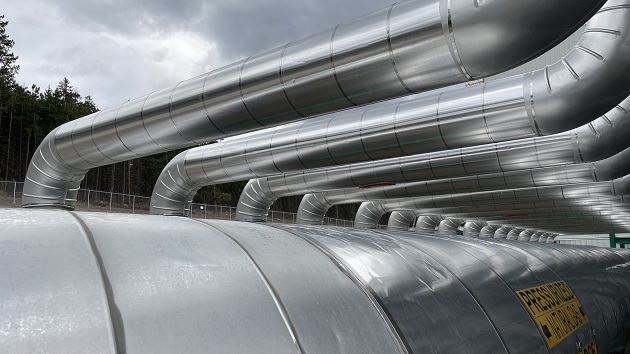Actively Pioneering British Columbia’s Low-Carbon Future
- None.
- None.
Insights
Enbridge's collaboration with the British Columbia Ministry of Energy, Mine and Low Carbon Innovation on a hydrogen blending study signifies a strategic move towards diversifying energy sources within existing infrastructure. The integration of hydrogen—a low-emission fuel—into the natural gas network could potentially reduce the carbon intensity of energy delivery systems. This initiative, if successful, may lead to a reduction in operational greenhouse gas emissions, aligning with global carbon reduction targets. For stakeholders, this represents a forward-thinking approach to energy transition, potentially enhancing Enbridge's market position as a leader in sustainable energy solutions.
Moreover, the development of a commercial hydrogen market in British Columbia could stimulate local economies, create jobs in the clean energy sector and attract investment. However, the scalability and economic viability of hydrogen blending are contingent upon technological advancements and market acceptance. The long-term impact on Enbridge's financials would depend on the pace of market adoption and the regulatory environment incentivizing low-carbon energy solutions.
Enbridge's engagement in carbon capture and storage (CCS) assessment with Geoscience BC underscores the company's commitment to environmental stewardship and the reduction of its carbon footprint. CCS is a critical component in the transition to a low-carbon economy, particularly for industries with hard-to-abate emissions. The Central Interior Geological CCS Assessment program aims to provide valuable data on the Nechako Basin's potential for carbon sequestration, which is essential for advancing CCS technologies.
Policy-wise, such initiatives may receive support from governments seeking to meet climate goals, which could lead to favorable regulatory frameworks for companies investing in CCS. The collaboration with government and industry partners also demonstrates a collective effort to address climate change, potentially influencing public perception and stakeholder confidence. While CCS offers a pathway to significant emissions reductions, the technology's success hinges on cost-effectiveness, regulatory support and public acceptance.
NORTHAMPTON, MA / ACCESSWIRE / January 17, 2024 / Enbridge:
A focus on R&D: Enbridge announces hydrogen blending study with provincial government, carbon capture and storage assessment with Geoscience BC
Some might not be aware of the considerable work unfolding so the energy transition can happen safely and seamlessly.
Important tools like carbon capture and storage (CCS), or adding hydrogen to the energy mix, can't just happen with the collective snap of our fingers, unfortunately.
In reality, developing a low-carbon economy requires collaboration and a commitment to research and development-exactly like two significant initiatives just announced in British Columbia. Both projects involve energy transition leader Enbridge.
On the hydrogen front, we announced funding for a hydrogen blending study to examine how natural gas mixed with hydrogen can be transported safely and reliable using existing natural gas transportation infrastructure, such as our Westcoast natural gas pipeline system, the primary natural gas transmission system in BC.
The British Columbia Ministry of Energy, Mine and Low Carbon Innovation is contributing, and FortisBC Energy, owner-operator of gas transmission and distribution assets in the province, is also undertaking a study of its own. Depending on results, the respective work could help inform development of a commercial hydrogen market in the province.
"We are working hard to reduce our greenhouse gas emissions and the carbon intensity of the energy we transport," Cynthia Hansen, Enbridge's Executive Vice President and President of Gas Transmission and Midstream, said today in a joint Enbridge and FortisBC news release.
"One way we're doing this is by using our existing energy infrastructure to transport low-carbon forms of energy such as hydrogen. This important study will play a critical role in determining how existing energy infrastructure can be used to transport hydrogen and how we can continue to work to advance the energy transition."
Hydrogen can be produced with low emissions (in the case of blue hydrogen) or no emissions (in the case of green hydrogen). When used to produce heat or electrical power, it emits only water vapor and air.
There are multiple practical benefits from leveraging existing pipeline networks, and blended hydrogen can be used for heating homes and businesses, as a transportation fuel substitute and for industrial purposes like metal refining, food processing and fertilizer manufacturing.
On the carbon capture and storage front, Geoscience BC announced on Tuesday that it's bringing together a consortium of government, industry (including Enbridge) and other partners for the first phase of a Central Interior Geological CCS Assessment program.
The project will compile existing geoscience information on the extensive Nechako Basin, focusing south-southwest of Prince George and providing carbon sequestration insights along the Highway 16 corridor west to Houston, BC.
The area hosts several current greenhouse gas (GHG) emitters and has the potential for new technologies such as hydrogen production that require future carbon storage.
Enbridge is committed to reducing its greenhouse gas emissions to achieve its goal of being net zero by 2050. And as the two initiatives above attest, we're re also interested in working with those who have similar goals.
(TOP PHOTO: Enbridge natural gas pipelines along our Westcoast transmission system, which has served as the backbone of British Columbia's natural gas industry since 1957).

Enbridge natural gas pipelines along our Westcoast transmission system, which has served as the backbone of British Columbia's natural gas industry since 1957
View additional multimedia and more ESG storytelling from Enbridge on 3blmedia.com.
Contact Info:
Spokesperson: Enbridge
Website: https://www.3blmedia.com/profiles/enbridge
Email: info@3blmedia.com
SOURCE: Enbridge
View the original press release on accesswire.com
FAQ
What significant initiatives did Enbridge announce in British Columbia?
What is the purpose of the hydrogen blending study?
What is the focus of the carbon capture and storage assessment?
What is Enbridge's goal in terms of greenhouse gas emissions?







